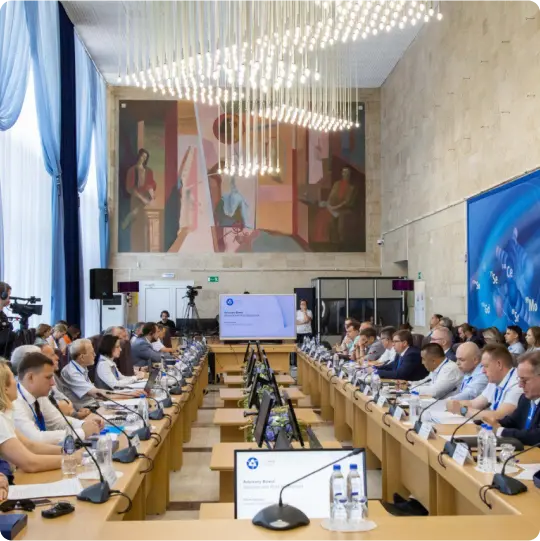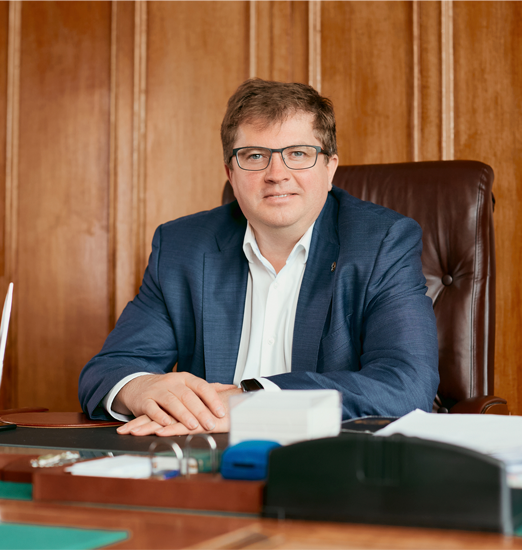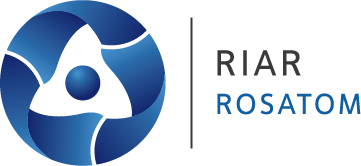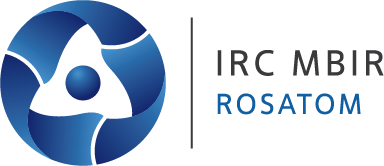Consortium
ROSATOM calls for an international partnership based on the new MBIR reactor
New members join the MBIR project by signing a Consortium Agreement, which forms the foundation for an International Research Center based on the MBIR reactor (IRC MBIR).
The Consortium provides bilateral and multilateral scientific programs and promotes international research partnerships and scientific cooperation with the aim of, iтеук alia, developing Generation IV technologies and implementation of a two-component nuclear power system.
The Consortium establishes uniform rules and conditions for the allocation and utilization by members of reactor capabilities within the MBIR core and shield for various reactor-based research activities and materials irradiation.
ADVISORY BOARD
The Advisory Board is a regular advisory body responsible for the management, coordination, methodological and analytical support, and expertise of the Research Program at MBIR
The Advisory Board is an expert community of scientists that will determine the main directions of research at MBIR, and form the scientific Research Program, taking into account the interests of all Consortium participants.
The Advisory Board consists of Member representatives, the Consortium Leader, the RIAR reactor operator, institutional organizations that have declared their intention to join the Consortium as participants, as well as current or potential partners and/or participants of multilateral research programs to be implemented on the MBIR basis.
The Advisory Board shall review and advise the IRC MBIR Council and the Governing Committee on scientific and technical matters related to the implementation of the MBIR project and research activities at the MBIR will be implemented at the MBIR.

CHAIRMAN of Advisory Board

RAS Professor.
Vice-president of the Russian Academy of Science (RAS), academician, scientific director of the Faculty of Chemistry of the MSU.
Doctor of Chemical Science, chairman of the Shenzhen MSU-BIT University’s Board of Directors.
A specialist in radiochemistry, whose research works are related to modern directions of radiochemistry.
- V.G. Khlopin Prize of the RAS. Awarded in 2016 for the cycle of works Radiochemical Aspects of Closed NFC and its Environmental Impact.
- Laureate of the I. I. Shuvalov Prize.
- Laureate in the field of energy and related sciences.
- Laureate of the Russian President's grant competition.
- Laureate of the diploma 100 Best Inventions of Russia.
- Badge For Contribution to the Development of the Nuclear Industry of Rosatom State Corporation.
ADVISORY BOARD MEMBERS
Advisory Board Committees
Video about the Advisory Board
The first meeting of the Advisory Board of the International Research Center MBIR was held in July 2022 on the basis of JSC “SSC RIAR”. More than 80 scientists, experts, and managers from more than thirty leading scientific centers of Russia, China, India, Kazakhstan, Uzbekistan, Vietnam, Algeria, Armenia, international organizations of the IAEA and JINR took part in the event in person and online.
MEMBERSHIP FORMS

Joining as a Key Member is possible already during the construction phase and gives the members the mechanism of access to the reactor resource for all period of exploitation, creates the preferential prices for acquirement of the services regarding materials irradiation in active zone of the reactor, gives possibilities for participating all its organizations, and allows to change the configuration of the reactor and the research program being carried out. Key members maximize both economic and scientific-practical benefits from working on the MBIR reactor.
The Associated Member will only have access to conduct research within the side shield area, where the neutron flux is significantly lower than in the core. Such members will only be offered the opportunity to participate in the IRC MBIR Advisory Board during the term of the respective executed contract and to receive irradiation services for materials at market prices that are significantly higher than those of the Key Member.
PROJECT MEMBERS
JOIN THE PROJECT

CONSORTIUM VIDEO
"In the near future, INP is going to enter into an Agreement on Accession to IRC MBIR Consortium, while the related legally binding terms and conditions were signed in November 2022.
Joining IRC MBIR Consortium and access to the MBIR reactor will expand the INP scientific capacity and enable various research in nuclear physics, medicine, reactor materials science, and production of radioisotope products.






















